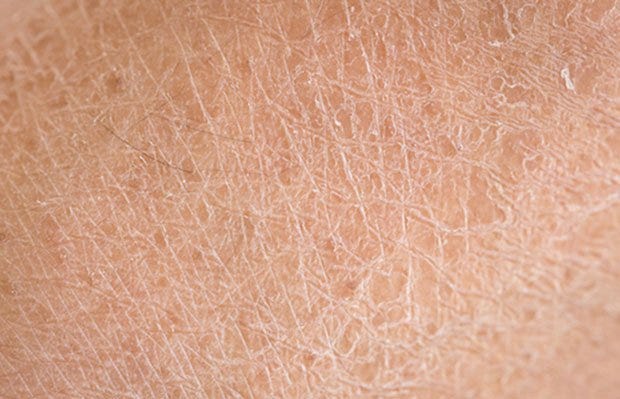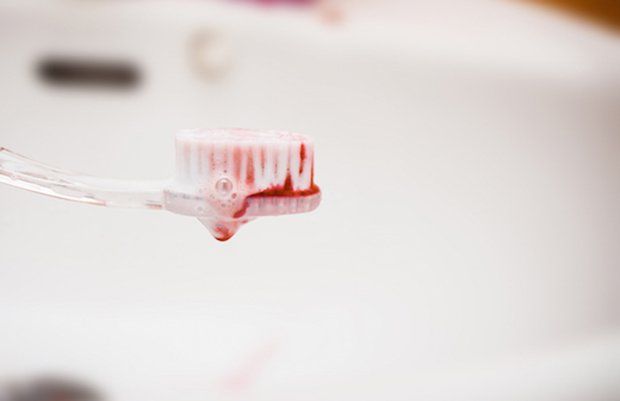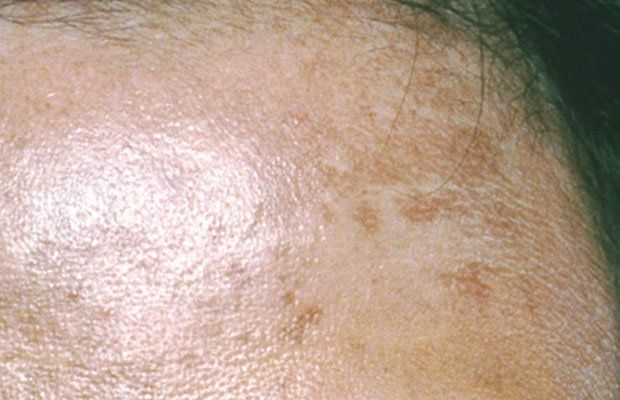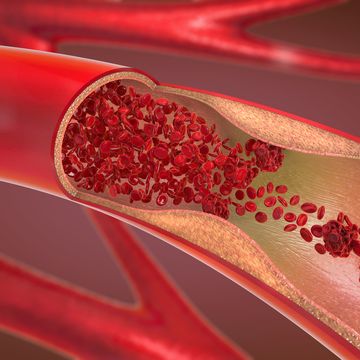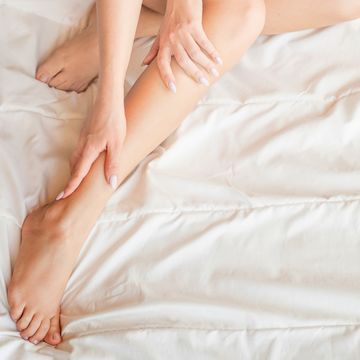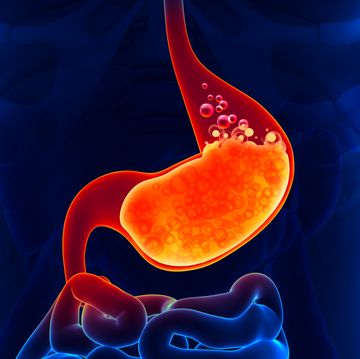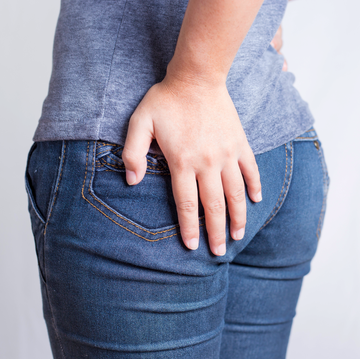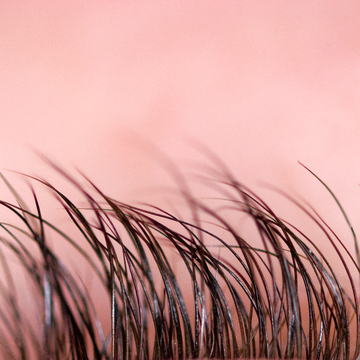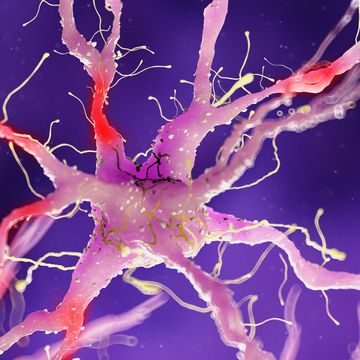Hormones play an important role in the way your body works. As part of your endocrine system, they're the chemical messengers in your blood that control many of your body's most important functions—from how much you poop and pee to how fast your hair grows. While we've all experienced the hormonal swings that come with common occurrences like PMS (or stress), conditions like thyroid disease, diabetes, and even pregnancy can really wreak havoc, causing symptoms that'll make you wonder what's going on with your bod. Here's what you should look out for. (In as little as 30 days, you can be a whole lot slimmer, way more energetic, and so much healthier just by following the simple, groundbreaking plan in The Thyroid Cure!)
1. You poop a lot more (or less).If Your Hormones Are Out of Whack Because of...Thyroid Disease
If you notice you're suddenly constipated or you're pooping all the time, it could be related to either hypothyroidism (not enough thyroid hormones) or hyperthyroidism (too much). "This isn't, 'I've always been constipated since I was 15,'" says Kathleen Figaro, MD, an endocrinologist in Bettendorf, Iowa. "It's more, 'I was doing quite well, and all of a sudden I'm constipated.'" That's because your thyroid hormones can make your organs operate more quickly (hyperthyroidism) or more slowly (hypothyroidism) when they get screwy.
MORE: 5 Hormones That Mess With You Every Month
2. Your eyes look bigger.
If anyone ever tells you that your eyes look bigger or that it looks like you're staring (like, all the time), it may be a sign of the most common form of hyperthyroidism, the autoimmune disorder Graves disease, says Figaro. Your eyes appear larger because your eyelids are elevated, since tissues behind the eye are inflamed.
3. Your hair stops growing.
If your hair feels coarser or you have less of it anywhere on your body—including your head—it could be a sign of hypothyroidism, since thyroid hormones are in charge of hair growth, says Figaro.
These are the 7 foods you should eat to stop hair loss:
4. You forget things.
While brain fog is a well-known symptom of hypothyroidism, poor short-term memory can also be a warning sign. Why? Low thyroid hormone levels control the brain's metabolism—and slower brain function affects your ability to pay attention in the moment and make memories, says Figaro.
5. Your skin is dry.
Flaky, dry skin can also be a sign of hypothyroidism, says Figaro. When you're producing less thyroid hormone, it slows down your skin's metabolism, too—which means it produces less of the oils that keep you moist.
MORE: Ask A Hot Doctor: What's Up With My Thyroid?
If Your Hormones Are Out of Whack Because of...Diabetes
6. You're getting a lot of yeast infections.
If you're dealing with many more yeast infections than usual, it may be related to diabetes, which messes with your levels of the hormone insulin, says Figaro. Diabetes raises your blood glucose levels—and the fungi causing these infections love sugars. Figaro says that diabetes is often asymptomatic and can go on for years without anyone picking up on it. "There are over 30 million people who have diabetes and don't know it," she says. And that's why it's important to share your family history with your doctor. If you have a genetic risk, eating well can definitely lower or increase your odds of getting it.
7. You're peeing all the time.
If you find you're suddenly peeing 24/7, it may be related to high levels of blood glucose because your pancreas is not functioning properly due to diabetes, says Figaro. Your kidneys work overtime to expel the excess sugar, making you have to tinkle more often.
If Your Hormones Are Out of Whack Because of...Pregnancy
8. Your gums bleed more than usual.
Gums bleeding way more often? Could be pregnancy. Soon after conception, progesterone levels increase dramatically to keep your body from rejecting the pregnancy. Progesterone, in turn, increases blood flow and causes your body to retain water everywhere—including your gums, which become puffy and more prone to bleeding. That's why it's all the more important to brush, floss, and see your dentist regularly when you're expecting. If you notice your gums continue to bleed after you're done brushing, talk to your doctor, says Ashlesha Dayal, MD, a high-risk ob-gyn at Montefiore Medical Center.
9. Your feet are bigger.
You can blame the increased progesterone of pregnancy again, since it helps loosen up your ligaments (including those in your feet) in preparation for delivery, says Dayal. Worth noting: There's no research definitively indicating that this is why many women claim to go up a shoe size when they're knocked up, Dayal notes.
MORE: 8 Bizarre Things That Happen To Your Body When You're Pregnant
10. You have a metallic taste in your mouth.
Thank another hormone that's boosted by pregnancy: HcG (or human chorionic gonadotropin), which the embryo starts producing after implantation. Higher levels of HcG cause nausea and vomiting—which can change your sense of taste and lead to that notorious metallic sensation in your mouth, says Dayal. To calm nausea, she suggests opting for homeopathic cures, like ginger (you can boil the root to make tea). Lemon water, she says, can also help get rid of that metallic taste.
11. You notice dark spots.
Dark patches of skin (known as melasma) on your cheeks, breasts, and elsewhere are a side effect of the increased estrogen in your body when you're expecting, says Dayal. Estrogen ups your levels of the skin pigment melanin.
The Bottom Line:
What's important, stresses Figaro, is to know your body. "Changes come and go," she says. "But if you notice a new, persistent symptom, it's a sign that something's changed." If you think something warrants a doctor's attention, keep track of changes in your body over time, noting frequency, severity, and timing. That way your doctor can identify if there's an issue and order any necessary tests.
This article was originally published by our partners at WomensHealthMag.com.

